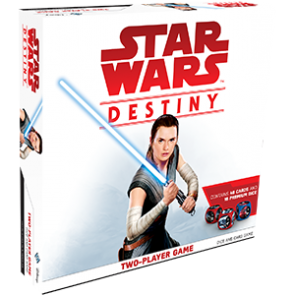The kitchen is bright and white. On the breakfast bar is a colossal faux-lego rollercoaster, a testament to a late-night drunken Kickstarter visit. Glancing down to the nearby dining table, I see a scattered mess of cards, dice and Star Wars art.
My face falls. "Oh no," I say. "You didn't".
"It's an experiment," my host replies. "Was just curious about the system. I'm not going to buy any boosters."
This triggers a sequence of awful flashbacks. Sitting in my car, surrounded by empty Magic: the Gathering wrappers, consumed by guilt at my wasteful profligacy. Visiting a dark house to see a dodgy man with a dodgy beard to buy cards unavailable elsewhere. Standing in a cold car park while strangers flip through binders of my cards, offering me a pittance in return.
"That's how it *starts*," I try to explain. "Next thing you know you're knee deep in card sleeves and re-mortgaging the house."
My host assures me the game works fine played with only the starter decks. Now I'm here, I might as well find out for myself. He explains the rules. It's a quick-fire game of discreet actions: rolling your dice and using them are two separate actions, for example. So it's all about order and timing.
Half an hour later, I'm unconvinced. I've lead Rey and Finn to ignominious defeat, but worse than the shame is the sense of not knowing quite why. A lot of it seemed to be down to rolling bad dice and drawing bad cards. But hey, it only took half an hour. Why not try again?
Another half-hour later, I'm hooked.
What emerged from the chaos and clatter of dice reminds me, just a little of Twilight Struggle. Not in a mechanical sense, but in the way that play is all about building and demolishing dreams. A turn starts with five cards in your hand and two resources to spend playing them. So you start to dream. If I roll *this*, then I can afford to play *that* but if *the other* happens I can counter with *this*.
Then you roll your dice and half the plan falls down. Then, as you're scrabbling for new ideas, your opponent rolls and the other half falls down. But you can't stop dreaming, rebuilding, trying to force some order into the falling bricks. No matter how many times everything gets planned and smashed, it's addictive to keep trying.
Next day, I order the starter decks and box of boosters.
About the third pack I open contains my first "legendary", the rarest and most powerful cards. And it's a doozy: Ashoka Tano, a character I am unfamiliar with but who I was, nevertheless, looking out for. As the parent of two girls, both of who like Star Wars, I wanted female characters for them to build decks around. And they don't come better than Ashoka. I tear into more packs, dreaming about what other exciting and valuable cards might lie within.
Not long after I find myself in a familiar situation. Sitting on my sofa, surrounded by empty Star Wars: Destiny wrappers, consumed by guilt at my wasteful profligacy. And yet at the back of my head is an itch, buzzing away, demanding more.
So when I arrange another game with another friend at a local club, I leave that stack of cards behind and just take the starter decks. We play under bright lights at a small, white Formica table that wouldn't look out of place in a 70's sci-fi film. There's barely room to fit our drinks, and our rolling dice constantly barrage into each other's card tableaux. The noise they make bouncing off the table is incredible and earns irritated looks from other gamers. I make a mental note to get a dice tray.
Our first game doesn't go that well. A lot of useless red faces get rolled. As an experiment, I roll my yellow Finn dice six times, and it comes up red half of them. "It's too random," complains my opponent. But he's a Star Wars fan and we've got nothing else to play, so we play again anyway.
Another half-hour later, he's hooked.
Because this is the thing about Destiny. Sure, it's random, although part of the purpose of building a deck is to ameliorate that randomness, to make sure you always have an option. But even when all your dice are rolling nothing but crap, and you're not pulling any of cards you need, it never feels unfair or unfun. In the same way that not winning a raffle never feels unfair.
Besides, whatever you roll or draw, it's all about using what you've got to try and steal an edge. It's about brinkmanship: if you've got a card that removes damage dice, do you play it now, or do you dare wait until your opponent has rolled them all? It's about whether to buy a lesser upgrade right now, or risk waiting a turn to afford a better one. No matter how the luck runs, this stuff is fun. It's varied and addictive. And when it isn't - and it never isn't - who cares when turns are so quick-fire and games are so short?
Next day, I start to build a deck around Ashoka. That buzzing itch intensifies because I don't have enough cards to copy a design from the internet. So I try to make my own with what I've got instead. She's a powerful character because she can roll her dice multiple times by paying "resources", the game's currency. I'm looking for powerful upgrades, a bit of defence, and combos that generate resources.
Options come up and I compare them and improve or reject them. Soon, I'm surrounded by small stacks of cards. Shortly after that, two hours have shot by into hyperspace and I'm sated with my own cleverness and creativity. I haven't looked at the internet once.
The result is a hit: with me playing a starter deck, it feels like I'm playing on a par with them. They roll the dice, screaming with delight when good stuff comes up, groaning in despair when it doesn't. We make lightsaber noises and Yoda impressions we do. At no point does anyone get grumpy about bad results.
It's such a success that for the next play, I take my newly constructed deck out to see my friend again. Played by an adult, it wipes the floor with his starter deck. And just like that, the itch is gone. I don't hesitate to grab his spare starter deck and we play again, right back in a galaxy far, far away.
And we agree: the experiment was a success.
 Games
Games How to resolve AdBlock issue?
How to resolve AdBlock issue? 
























